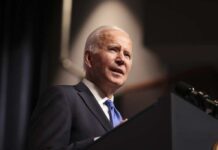
OPEC+ has reached an agreement to extend its oil production cuts, a move likely to increase energy prices in the United States just ahead of the 2024 presidential election. The decision, reported by Reuters, could pose a significant challenge for President Joe Biden as he seeks re-election.
The oil cartel, primarily composed of Middle Eastern nations and other oil-producing states, has decided to prolong its existing production cuts of 3.66 million barrels per day until the end of 2025. Additionally, it will extend ongoing cuts of 2.2 million barrels per day through September 2024 reported.
Currently, OPEC and its allies are reducing their production by about 5.8 million barrels per day, which represents approximately 5.7% of the world’s demand. This decision to maintain and extend cuts could lead to a supply deficit in the global market, likely driving up oil prices. According to The Wall Street Journal, these higher prices could persist through this fall’s presidential election.
The Biden administration is likely concerned about the potential for rising energy costs as the election approaches. In response, the Department of Energy (DOE) has announced a plan to release 1 million barrels of gasoline from the Northeast Gasoline Supply Reserve to stabilize prices at the pump. Additionally, John Podesta, a senior climate adviser in the Biden administration, has suggested the possibility of further drawdowns from the Strategic Petroleum Reserve (SPR) if necessary.
Amrita Sen, co-founder of the energy think tank Energy Aspects, commented on the deal, stating, “The deal should allay market fears of OPEC+ adding back barrels at a time when demand concerns are still rife. It should be seen as a huge victory of solidarity for the group and [Saudi Arabian Energy Minister Prince Abdulaziz bin Salman Al Saud].”
OPEC members include key oil-producing countries such as Saudi Arabia, Kuwait, the United Arab Emirates, Libya, and Venezuela. Russia, while not a full member of OPEC, aligns with OPEC+ in these production decisions. Analysts had anticipated that OPEC and its allies would extend production cuts due to declining prices and weak demand.
Neither the White House nor the DOE responded immediately to requests for comment on the matter. As the election nears, the Biden administration will likely face increased scrutiny over energy prices and their economic impact on American consumers.


























